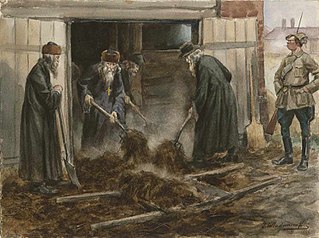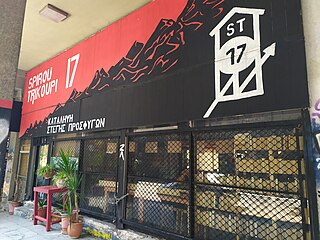Related Research Articles

Conscription is the state-mandated enlistment of people in a national service, mainly a military service. Conscription dates back to antiquity and it continues in some countries to the present day under various names. The modern system of near-universal national conscription for young men dates to the French Revolution in the 1790s, where it became the basis of a very large and powerful military. Most European nations later copied the system in peacetime, so that men at a certain age would serve 1–8 years on active duty and then transfer to the reserve force.

The Finnish Defence Forces are the military of Finland. The Finnish Defence Forces consist of the Finnish Army, the Finnish Navy and the Finnish Air Force. In wartime the Finnish Border Guard becomes part of the Finnish Defence Forces.
Greece is a parliamentary representative democratic republic, where the President of Greece is the head of state and the Prime Minister of Greece is the head of government within a multi-party system. Legislative power is vested in both the government and the Hellenic Parliament. Between the restoration of democracy in 1974 and the Greek government-debt crisis the party system was dominated by the liberal-conservative New Democracy and the social-democratic PASOK. Since 2012, the anti-austerity, democratic socialist party Syriza has taken the place of PASOK as the largest left wing party, with their first election victory in January 2015.
The Swiss Armed Forces operates on land and in the air, serving as the primary armed forces of Switzerland. Under the country's militia system, regular soldiers constitute a small part of the military and the rest are conscripts or volunteers aged 19 to 34. Because of Switzerland's long history of neutrality, the Swiss Armed Forces do not take part in conflicts in other countries, but do participate in international peacekeeping missions. Switzerland is part of the NATO Partnership for Peace programme.

A conscientious objector is an "individual who has claimed the right to refuse to perform military service" on the grounds of freedom of thought, conscience, or religion.

The Hellenic Army, formed in 1828, is the land force of Greece. The term Hellenic is the endogenous synonym for Greek. The Hellenic Army is the largest of the three branches of the Hellenic Armed Forces, also constituted by the Hellenic Air Force (HAF) and the Hellenic Navy (HN). The army is commanded by the chief of the Hellenic Army General Staff (HAGS), which in turn is under the command of Hellenic National Defence General Staff (HNDGS).

Mobilization is the act of assembling and readying military troops and supplies for war. The word mobilization was first used in a military context in the 1850s to describe the preparation of the Prussian Army. Mobilization theories and tactics have continuously changed since then. The opposite of mobilization is demobilization.

Forced labor, or unfree labor, is any work relation, especially in modern or early modern history, in which people are employed against their will with the threat of destitution, detention, violence including death, or other forms of extreme hardship to either themselves or members of their families.

Military service is service by an individual or group in an army or other militia, air forces, and naval forces, whether as a chosen job (volunteer) or as a result of an involuntary draft (conscription).

In the United States, military conscription, commonly known as the draft, has been employed by the U.S. federal government in six conflicts: the American Revolutionary War, the American Civil War, World War I, World War II, the Korean War, and the Vietnam War. The fourth incarnation of the draft came into being in 1940, through the Selective Training and Service Act. It was the country's first peacetime draft. From 1940 until 1973, during both peacetime and periods of conflict, men were drafted to fill vacancies in the U.S. Armed Forces that could not be filled through voluntary means. Active conscription in the United States ended in 1973, when the U.S. Armed Forces moved to an all-volunteer military. However, conscription remains in place on a contingency basis and all male U.S. citizens, regardless of where they live, and male immigrants, whether documented or undocumented, residing within the United States, who are 18 through 25 are required to register with the Selective Service System. United States federal law also continues to provide for the compulsory conscription of men between the ages of 17 and 45 and certain women for militia service pursuant to Article I, Section 8 of the United States Constitution and 10 U.S. Code § 246.
Greece recognizes same-sex cohabitation agreements, which provide several of the rights and benefits of marriage. Legislation allowing such unions was approved by the Hellenic Parliament on 23 December 2015 and published in the Government Gazette the following day. In 2022, the opposition SYRIZA party submitted a bill for same-sex marriage and adoption.

Conscription in Finland is part of a general compulsion for national military service for all adult males defined in the section 127 of the Constitution of Finland.

Civil conscription is the obligation of civilians to perform mandatory labour for the government. This kind of work has to correspond with the exceptions in international agreements, otherwise it could fall under the category of unfree labour. There are two basic kinds of civil conscriptions. On the one hand, a compulsory service can be ordered on a temporary basis during wartimes and other times of emergency, like severe economic crisis or extraordinary natural events to provide basic services to the population. These include, but are not limited to, medical care, food supplies, defense industry supplies or cleanup efforts, following a severe weather or environmental disaster for the duration of the emergency. Therefore, it generally makes striking illegal for the duration of the civil mobilization. On the other hand, a revolving mandatory service may be required for a longer period of time, for example, to ensure community fire protection or to carry out infrastructure work at a local or community level.

Conscription in South Korea has existed since 1957 and requires male citizens between the ages of 18 and 35 to perform compulsory military service. Women are not required to perform military service, but they may voluntarily join the military.
The Greek government-debt crisis began in 2009 and, as of November 2017, was still ongoing. During this period, many changes had occurred in Greece. The income of many Greeks has declined, levels of unemployment have increased, elections and resignations of politicians have altered the country's political landscape radically, the Greek parliament has passed many austerity bills, and protests have become common sights throughout the country.
This article details the fourteen austerity packages passed by the Government of Greece between 2010 and 2017. These austerity measures were a result of the Greek government-debt crisis and other economic factors. All of the legislation listed remains in force.

The anti-austerity movement in Greece involved a series of demonstrations and general strikes that took place across the country. The events, which began on 5 May 2010, were provoked by plans to cut public spending and raise taxes as austerity measures in exchange for a €110 billion bail-out, aimed at solving the Greek government-debt crisis. Three people were killed on 5 May in one of the largest demonstrations in Greece since 1973.
During the failed 2016 Turkish coup d'état attempt on 15 July 2016, eight Turkish military personnel claimed asylum in Greece. The Turkish servicemen arrived in Greece on board a UH-60 Black Hawk helicopter. Although a Greek court ruled that three of the officers could be extradited to Turkey, Greece's Supreme Court overruled that decision and denied the extradition of all eight soldiers. This was one of multiple similar incidents during the coup attempt.
The State Service for Mobilization and Conscription of Azerbaijan was created on February 13, 2012 by decree of Ilham Aliyev, President of the Republic of Azerbaijan. On implementation of the law on “Military job and military service”, the Military Commissariat of the Republic of Azerbaijan, Military Commissariat of Nakhchivan Autonomous Republic, and the military commissariats of regions and cities subordinated to Ministry of Defense of the Republic of Azerbaijan were abolished, and the State Service for Mobilization and Conscription of Azerbaijan was established.

Athens refugee squats exist since the 2015 spike in the European migrant crisis. Greece has been a destination for migrants seeking refuge on the European continent via the "Balkan Route." Coalitions of solidarity groups and migrants have established squats throughout Athens to house refugees, demonstrating an alternative to solutions offered by the European Union and NGOs. The squats are grouped together in the Coordination of Refugee Squats. Notable projects included 5th School and City Plaza. In late 2019, the New Democracy party declared it would evict all the squats.
References
- ↑ "Belgian Doctors Answer Call‐Up". The New York Times. 13 April 1964.
- ↑ "Greek gov't to issue 86,000 'civil mobilization' orders for teachers …before the strike". 11 May 2013.
- ↑ ""Civil mobilization» | StopCartel NEWS NETWORK". Archived from the original on 18 March 2017. Retrieved 28 January 2015.
- ↑ "Still no gas, as truck drivers put foot down". ekathimerini.com. Retrieved 31 July 2015.
- ↑ "Επιστράτευση απεργών - Σε επιφυλακή ο στρατός" (in Greek). ethnos.gr. Archived from the original on 21 December 2011. Retrieved 31 July 2015.
- ↑ "Metro strike ends as workers forced to return to jobs". ekathimerini.com. Retrieved 31 July 2015.
- ↑ "Greek government proceeds with conscription of maritime workers". protothema.gr. Archived from the original on 4 March 2016. Retrieved 31 July 2015.
- ↑ "Greece orders power workers to end strike". ft.com. Retrieved 31 July 2015.
- ↑ מלץ, ג'ודי (10 February 2003). "מיהו חיוני?". Globes (in Hebrew). Retrieved 19 May 2020.
- ↑ "Israeli Parliament Legislation regarding Civil Mobilization" (PDF). Archived (PDF) from the original on 4 March 2016.